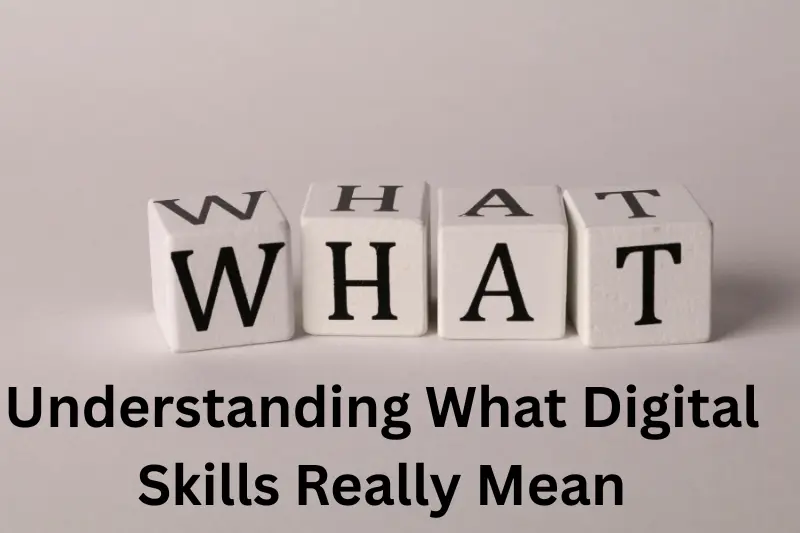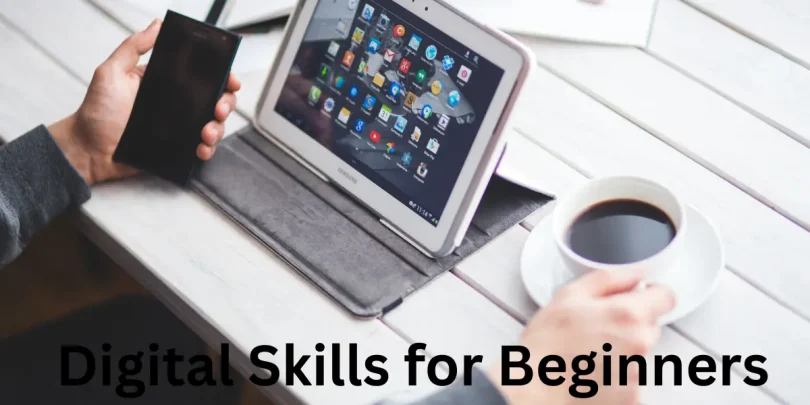Let’s be real—technology can feel like a mystery when you’re starting out. You might look around and see people typing fast, moving between tabs effortlessly, and using terms like “cloud storage,” “AI tools,” or “SEO” as if they were born with a keyboard in hand. Meanwhile, you might just be trying to figure out how to attach a photo to an email without messing something up. Don’t worry—you’re not alone. Many people, from students to parents to professionals, struggle when they first start exploring technology. The good news? You don’t have to be a genius to master digital skills for beginners. You just need patience, curiosity, and a willingness to learn step by step. This isn’t about becoming a computer expert overnight; it’s about building comfort and confidence in a digital world that’s becoming more important every single day.
Understanding What Digital Skills Really Mean

Digital skills are basically the abilities that help you use technology effectively in everyday life. These aren’t just for tech jobs or fancy careers—they’re life skills now. Think about it: from paying bills online, filling out a job application, or joining a video call with your friends, everything requires some level of digital understanding. For beginners, digital skills might mean learning how to use a smartphone efficiently, sending emails, typing documents, browsing the internet safely, or managing online accounts. It’s like learning to drive—you start with understanding how things work, practice regularly, and eventually, it becomes second nature. The best part? You don’t need expensive tools or fancy software to start learning; you can begin with what you already have—a phone, a laptop, or even a shared computer.
Why Digital Skills Are Essential Today
Here’s the deal: we live in a world where everything is connected through technology. From classrooms to offices to businesses, digital skills are now the foundation of success. Knowing how to use technology isn’t just helpful—it’s essential. Employers today look for people who can navigate digital tools, communicate online, and handle basic software. Even outside work, being digitally literate helps you stay informed, manage your finances, shop online, or stay in touch with family and friends. Without these skills, simple daily tasks can feel frustrating or even impossible. Imagine trying to apply for a job but not knowing how to upload your resume or fill out an online form. Or maybe you run a small business but can’t figure out how to market it on social media. Having digital skills bridges those gaps and gives you confidence to take on challenges that once seemed intimidating.
The Real Struggles Beginners Face

Let’s have some real talk—it’s okay to feel lost when you’re starting out. Many beginners feel anxious about making mistakes or breaking something. Maybe you’ve tried watching a tutorial online, but the instructor moves too quickly, and you end up pausing every few seconds. Or maybe you ask someone for help, and they start explaining in complicated terms that make your head spin. That frustration is completely normal. Some common challenges beginners face include fear of pressing the wrong button, feeling embarrassed to ask basic questions, being overwhelmed by the number of apps available, or getting stuck when updates change how things look. The important thing to remember is that everyone was a beginner once. Even the most tech-savvy person today once Googled “how to copy and paste.” Learning digital skills is a process—it takes time, patience, and a willingness to try again even when things don’t work the first time.
You may also like to read these articles
Unlock Your Potential with the Best Skill Development Courses Online
Unlock Your Potential with Practical Skill Development Programs
Unlock Future Success with Skill Development for Students
Transform Your Career with Expert Professional Skill Building Tips
Unlock Your Confidence: how to improve communication skills Fast
How to Start Learning Digital Skills the Smart Way
The trick to learning digital skills successfully is to start small and stay consistent. You don’t need to learn everything at once. Begin with the basics—like sending and receiving emails, typing simple documents, or searching for information online. Once you’re comfortable with those, move on to slightly more advanced skills like organizing files, managing cloud storage, or creating simple spreadsheets. The idea is to build gradually. For example, you might start by exploring how to set up and use Google Docs for typing and saving work. Next, you can practice using Google Search to find helpful resources or tutorials. After that, try learning how to schedule events using an online calendar. Each small step builds your confidence and opens doors to more advanced learning. Real talk: you don’t need to be perfect, you just need to be curious.
Building Confidence Through Practice
Confidence doesn’t come from reading—it comes from doing. The more you use digital tools, the more natural they’ll feel. Try to make technology a part of your daily routine. For instance, you could start each day by reading an article online, sending an email, or organizing your digital files. If you want to learn a new app, give yourself a small challenge like “I’ll explore one new feature today.” You can also watch short, beginner-friendly tutorials on YouTube or join online learning platforms that offer free basic courses. Another great way to build confidence is by asking for help when you need it—whether it’s from a friend, a coworker, or even an online community. Remember, no one is judging you. Every expert started out just like you—curious and unsure, but determined to learn.
Essential Digital Skills Every Beginner Should Focus On
There are a few must-have digital skills that every beginner should learn because they form the foundation of everything else. The first is basic device handling—knowing how to turn on your computer, navigate your smartphone, adjust settings, install updates, and manage files. Next is internet usage—understanding how to browse safely, use search engines effectively, and recognize reliable sources. Email communication is another important skill; it’s how most professionals exchange information, apply for jobs, and stay connected. You should also get familiar with tools like Google Docs or Microsoft Word for creating and editing documents, and learn to organize files properly using cloud services like Google Drive or Dropbox. In addition, social media literacy is essential today. Learning how to use platforms like Facebook, Instagram, or LinkedIn responsibly can help you stay connected and even grow your career or business. Finally, don’t ignore cybersecurity basics—learn how to create strong passwords, recognize scams, and protect your personal data.
The Right Mindset for Learning Digital Skills
Here’s something you should always remember: being good at digital skills isn’t about being born “techy.” It’s about being open to learning. Many people hold themselves back because they think, “I’m too old to learn,” or “I’m not good with computers.” But technology is designed to make life easier, not harder. All you need is patience and curiosity. Start thinking of every challenge as an opportunity to grow. If you get stuck, take a break and try again later. If something doesn’t make sense, look for simpler explanations online. The key is to keep experimenting. Every time you solve a problem or learn something new, you’re building confidence. And soon, what once seemed difficult will become effortless.
Best Resources to Learn Digital Skills
You don’t have to spend money to learn digital skills—there are plenty of free and helpful resources online. YouTube is one of the best places to start because you can find video tutorials on almost any topic, from basic computer use to more advanced applications. Google also offers a free program called “Digital Garage,” which provides structured lessons for beginners. Websites like Coursera and Udemy have courses that start from the basics, and many are available for free or at low cost. If you prefer in-person help, check whether your local library or community center offers digital literacy programs. You can even ask friends or family to show you how they use certain apps or tools. Learning from someone you trust often makes the process feel less intimidating and more enjoyable.
Staying Safe in the Digital World
As exciting as the digital world is, it’s important to stay safe while exploring it. Cybersecurity might sound complicated, but it really just means protecting your personal information online. Avoid using the same password for every account, and never share your personal details on websites you don’t trust. Be cautious when clicking links in emails or messages—they could lead to scams or harmful websites. Always check the source before downloading anything. Using antivirus software is another smart way to keep your device secure. Remember, being safe online doesn’t mean being fearful—it just means being aware and careful.
How Digital Skills Can Boost Your Career
Once you start building your digital skills, you’ll notice how much they can improve your professional life. Most employers now expect some level of digital literacy, even for entry-level roles. Understanding how to use email, create documents, or manage spreadsheets can set you apart from other candidates. And if you’re running your own business, digital skills can help you reach more customers through social media or build an online store. You can also use your skills to work remotely or start freelancing. The internet is full of opportunities once you know how to use it effectively. Digital literacy gives you flexibility and independence—it allows you to work, learn, and connect from anywhere.
Overcoming Fear and Frustration
Everyone feels frustrated with technology at some point. Maybe your computer freezes, or you accidentally delete a file you spent hours working on. It happens to everyone—even experienced users. The key is not to give up. Mistakes are part of the learning process. The more problems you solve, the more confident you become. Instead of seeing technology as something scary or complicated, think of it as a helpful tool that’s waiting for you to master it. Keep practicing, and don’t be afraid to laugh at your mistakes—they’re proof that you’re learning.
Keeping Up with the Digital World
Technology changes fast. New apps, updates, and tools appear almost every week. But don’t let that overwhelm you. You don’t need to know everything—just stay curious and keep learning. Follow tech blogs, YouTube channels, or online communities that explain updates in simple language. Take things one step at a time. Think of learning digital skills as a lifelong journey rather than a one-time task. The more you explore, the easier it gets.
Conclusion and Takeaway
Learning digital skills for beginners isn’t about mastering every tool or app out there. It’s about building confidence, developing independence, and becoming adaptable in a digital-first world. Every small step you take brings you closer to comfort and fluency with technology. You’re not just learning how to use gadgets—you’re unlocking opportunities for growth, communication, and success.
Here’s a simple checklist to help you stay on track:
- Choose one new skill to focus on each week.
- Practice regularly, even if it’s just ten minutes a day.
- Ask questions without hesitation.
- Keep a positive attitude, even when things get confusing.
- Celebrate every small success—you’ve earned it.
FAQs
What are digital skills for beginners?
Digital skills for beginners are the basic abilities needed to use technology effectively—like browsing the internet, sending emails, using social media, and handling simple online tasks confidently.
Why are digital skills important today?
Digital skills help you stay connected, improve job opportunities, and make everyday tasks—like online shopping or learning—much easier in today’s tech-driven world.
How can beginners start learning digital skills?
Start with small steps—explore free tutorials, take beginner-friendly online courses, and practice regularly using devices like smartphones or computers.
What are some examples of essential digital skills?
Essential digital skills include typing, using Microsoft Office or Google Docs, managing files, basic cybersecurity, and understanding how to use social media safely.
How long does it take to learn digital skills for beginners?
It depends on your pace, but with regular practice, most beginners can build a strong foundation in a few weeks to a few months.






